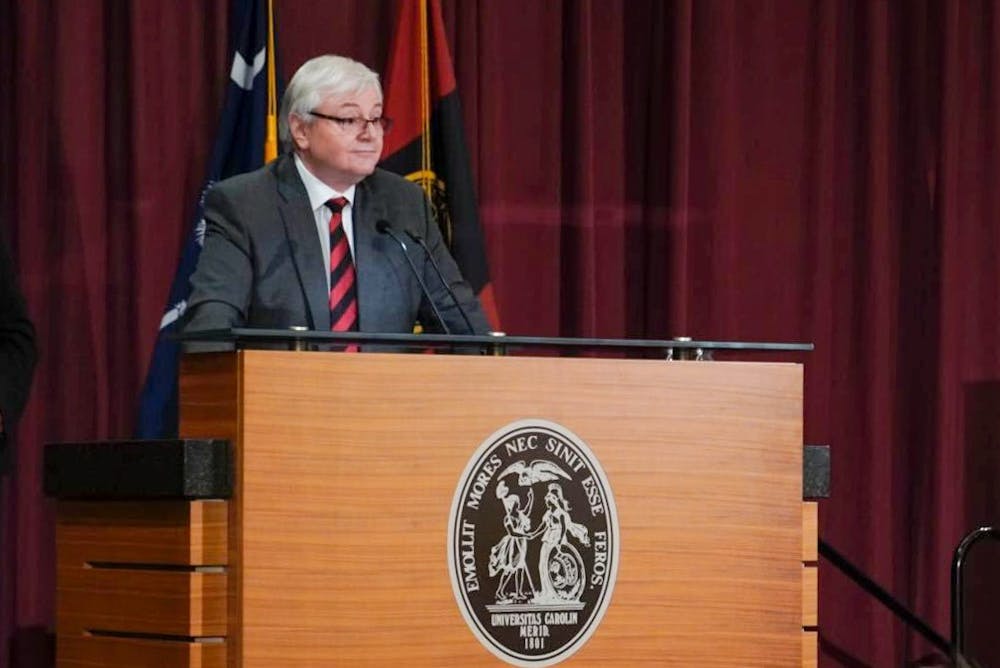Retraction: (April 15, 2022 at 9:20 a.m.): The original version of this article said the author hopes that University President-Elect Michael Amiridis will not continue “protecting abusers.” This improperly implies that USC professor David Voros is an abuser. Voros has faced civil claims of harassment, not criminal sexual misconduct charges. Those claims were dismissed and settled out of court. Additionally, The Daily Gamecock did not reach out to Voros for comment prior to publication. Two sentences about Voros were removed, as they were not central to the story. The Daily Gamecock regrets the error.
While we are cautiously optimistic about Michael Amiridis’ appointment as the 30th President of the University of South Carolina, he must first escape the shadow of the failures of the board of trustees and his predecessors.
In a press conference immediately after being elected president, he told the press that he was "looking forward to establish trust with the students, working together with the students, listening to the students and being able to find solutions together."
During Friday’s virtual panels, Amiridis spoke about the need to build a more diverse campus.
“Welcoming students of color, welcoming faculty members, is no longer enough. It’s not an issue of welcoming: It’s an issue of listening to them, understanding what their needs are and changing our structures by being inclusive in our decision making,” Amiridis said.
He outlined a plan to recruit a more diverse doctorate program, from which USC can create a pool of diverse candidates it can pull faculty from. This action plan is our first glimpse of concrete steps Amiridis claims to take to spark change at the university.
He took a firm stance against sexual harassment and violence, saying “there is no room for predators, sexual predators in an academic community. Let’s be clear about this.”
It’s also hard to disagree with his statement that "we need to focus on the public good that the university represents" and "make the case for the importance of the University of South Carolina."
Amiridis said there is a need to provide funds for low-income students and spoke about how the University of Illinois Chicago, where he is currently chancellor, dedicated significant amounts of money towards solving food insecurity.
Indeed, Amiridis seemed to have all the answers regarding plans to better the university, but words alone don’t mean anything. Our past two presidents made similarly optimistic statements during their own hiring process, but we often saw very little beneficial or tangible action.
"Speed matters," Interim university President Harris Pastides said when he was first appointed president in 2008. "Because the challenges ahead are not slowing down. We face and we must embrace, as Martin Luther King said, the fierce urgency of now."
Pastides’ successor, former university President Bob Caslen, left the university in an equally — if not more — problematic spot.
"It is clear the University of South Carolina is on track to be the preeminent institution of higher education in America today, and I will work to move this university and system in that direction," Caslen said when he was elected in July 2019.
His presidency didn’t quite work out as he had hoped — his time on the Horseshoe saw multiple student protests and, instead of his initial praise, he told The Post and Courier "this place sucks so bad" after a plagiarism-fueled resignation.
"I think a lot of us are thinking of looking for somebody who is the antithesis of what president Caslen was for our university," Alexa Dean, an undergraduate academic advisor, previously told The Daily Gamecock.
For some of our community, the sentiment is mutual.
As his predecessors did, Amiridis is coming into office with a host of good-sounding statements and plans.
In a diversity statement, he said USC needs to adjust for underrepresented minorities and low-income students by creating "an inclusive environment in all areas of the academic experience and adjust(ing) our practices to address their needs."
Will Amiridis put effort into renaming buildings that are currently named after defenders of slavery and segregation? Previous efforts died on Pastides’ desk, but students and activists are still demanding change.
Will he act to stop the trend of declining enrollment for Black students and make USC more accessible to all students of color in South Carolina?
We are hopeful — yet skeptical — that his words are not just to ease the student body into a new administration, and that the new president's promises hold more validity than those of his predecessors.
Only time will tell if Amiridis will back up his statements and ideas with concrete action, and it’s vital that the USC community does all it can to hold him to his plans and promises.
Of course, there is only so much that one man can do. Amiridis will be working in the shadow of a board of trustees and an administrative structure that has routinely shown itself to be unconcerned about the needs and desires of the student body.
After requesting community feedback about Amiridis’ qualifications, the board waited less than two hours after those evaluations were due to vote on the appointment — they were clearly deeply curious about our input.
Amiridis must do all he can to turn the university into one which prioritizes leadership and puts the interests of its students, faculty and staff above those of its board. We are hopeful for change, but after two disappointing administrations, our distrust of the administration is rightful.

